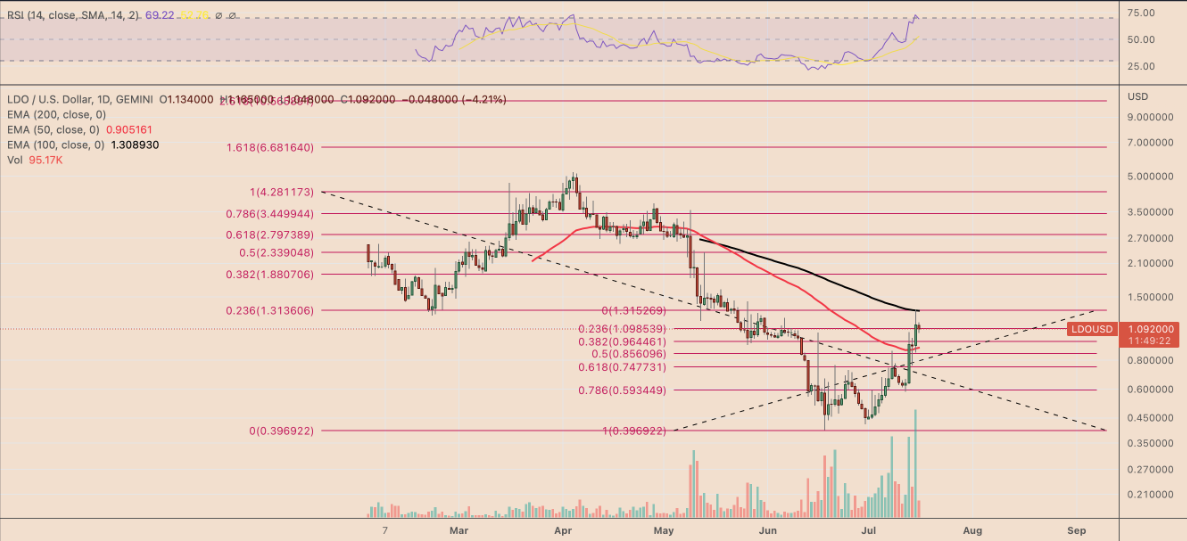😔 broken promises
Web3 ownership remains surprisingly centralised, Lido DAO most overbought since April and major updates from mesha.
Hi friends👋
Welcome to the mesha tribe: a biweekly newsletter by mesha that brings you the latest updates on DAO news and governance to help you take your project #ToTheMoon🚀
In this edition, we discuss:
Two major Web3 events
Best practices for managing DAOs
DAOTools to help scale your project
Updates from mesha
In the news 📰
1. DAO ownership is mostly concentrated
Turns out, decentralized systems aren't as decentralized as they say.
According to a recent report by Chainalysis, less than 1% of all holders in major DAOs have 90% of the voting power.
The research, which analyzed the governance structures of ten prominent DAOs, said that the findings contradict the core tenets of decentralization and restrict small token holders from "meaningfully contributing to the proposal process."
It further cited the Solend SLND1 proposal as evidence of the concentration of decision-making power in DAOs.
What happened? Last month, to avoid a DeFi implosion, the Solend team tried to take over a whale’s account and execute the liquidation themselves through over-the-counter (OTC) desks. The proposal received 1.1 million "yes" and 30,000 "no" votes, but out of the total "yes" vote, 1 million came from a single user. While the team initially approved the proposal, they invalidated it after receiving backlash from the community.
DeFi-led growth: DeFi-related DAOs have also recently surpassed other categories like NFTs and VCs, which have fewer on-chain treasuries. According to the report, 83% of all DAO treasury value came directly from the DeFi space.
In addition, more than 82% of the DAOs treasury funds originated from decentralized services, while only 17.9% came from centralized platforms, suggesting the heightened engagement of DeFi protocols with DAOs.
Why it matters? As more and more Web3 organizations choose DAO-like infrastructure for their projects, we will see an emergence of tooling services and advocacy groups dedicated solely to helping govern and grow them.
2. Lido undergoes ‘overbought’ correction
Over the past two weeks, Lido DAO (LDO)—a liquid staking solution designed for Ethereum 2.0—has surged more than 200%.
It went from as low as $0.58 on July 12 to as high as $1.83 on July 17.
But that ended on Monday when the price of LDO plunged significantly after its key momentum indicator entered the "overbought" territory amid the bear market.
Sudden movements in its daily relative strength index (RSI) and its 100-day exponential moving average (EMA) were the main reasons for the token's dramatic price change.
An overbought RSI means that the rally may be nearing its end as it prepares for a corrective price pullback. Its 100-day EMA also reached $1.30, thereby capping the token from extending its rally.
Why the jump? The surge came after one of Ethereum's core developers Tim Beiko proposed September 19 as the provisional deadline for the Merge—Ethereum's long-awaited transition to proof-of-stake (PoS).
But that's subject to the Goerli testnet merge going ahead as planned.


Shortly after the announcement, LDO surged as much as 25%. The token is currently worth $1.48.
Why it matters? After the Merge, miners will be replaced by validators. Consequently, they will have two options: either move to PoW networks like Ethereum Classic or operate as PoW networks like Ethereum Classic or provide their processing power to Web3 protocols like Render Network and Livepeer.
Curated reads 📚
How DAOs Can Adopt Best Practices for Treasury Management in a Bear Market: What should your DAO's treasury prioritize when the markets are down—liquidity or hedging risks? In this insightful piece, UMA Treasurer Kevin Chan highlights some of the best practices DAOs can adopt for managing their treasuries during a bear market.
What It’s Like to Work as a DAO Bounty Hunter: Ever wondered what it's like to leave the 9-to-5 grind behind to work for a DAO—or maybe 3 of them? Well, here's a sneak peek into the life of one such DAO bounty hunter.
DAOTools 🔨
BrainTrust: BrainTrust is a decentralized talent network that connects skilled, vetted knowledge workers with the world’s leading companies. Its 700,000+ community members own and control Braintrust through its native BTRST token, allowing them to redistribute value to Talent and Organizations.
Bribe Protocol: Bribe is a DeFi protocol that creates DAO infrastructure tooling to incentivize governance participation. Incubated by Advanced Blockchain AG and Composable Labs, the protocol pays its token holders using its native token, BRIBE.
Updates from mesha 📢
We know that building a DAO is hard.
Not only do you have to incentivize consistent member participation, but you also have to ensure that they're working towards a common goal.
While such activities can be easily automated, the Web3 industry currently lacks the right set of tools and resources required to do so.
This is where mesha can help.
Our smart money management platform can help your DAO or Web3 organization simplify its finances so that you can focus on building.
You can easily track your project's finances using our comprehensive on-chain treasury tools and benefit from our broad range of financial products and services like corporate crypto credit cards, DeFi, and more.
Want to try us out? Sign up for a demo 👇
Join the tribe 🤝
Are you a BUIDLer in Web3 or DAOs?
If so, subscribe to the mesha tribe for a weekly dose of best industry practices, management tactics, and growth hacks to take your organization #ToTheMoon🚀






